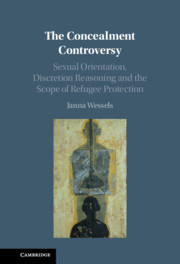 The Concealment Controversy
The Concealment Controversy Distinguishing Protected Groups from Persecuted Groups
from Part II - Exploring the Limits of Protection
Published online by Cambridge University Press: 19 July 2021
Chapter 7 shows that the struggles concerning the claimant’s potential ‘discretion’ have remained the same since Grahl-Madsen’s groundbreaking 1966 book. On the one hand, it may be the persecutor who defines what and who is persecuted. In this case, it is relevant whether harm is differentially inflicted due to the fact that the persecutor imputes or assumes a political opinion, irrespective of the claimant’s ‘actual’ convictions. On the other hand, it may be the claimant who defines group membership. Here, it is relevant whether the claimant has a deeply held political opinion. The task for the decision-maker is then to establish the deep conviction. The approaches do not necessarily map onto each other. When what is defined as the protected group does not equal the persecuted group as defined by the persecutor, ‘discretion’ logics emerge: Ultimately, in all these approaches, the protected group is made up of those who have been or are deemed at risk of being discovered by the persecutor – that risk being deduced either from their identity or their conduct, but always linked to their past or presumed future visibility. Those deemed ‘unrecognisable’ fall outside the protected group and are returned to (continued) ‘discretion’.
To save this book to your Kindle, first ensure [email protected] is added to your Approved Personal Document E-mail List under your Personal Document Settings on the Manage Your Content and Devices page of your Amazon account. Then enter the ‘name’ part of your Kindle email address below. Find out more about saving to your Kindle.
Note you can select to save to either the @free.kindle.com or @kindle.com variations. ‘@free.kindle.com’ emails are free but can only be saved to your device when it is connected to wi-fi. ‘@kindle.com’ emails can be delivered even when you are not connected to wi-fi, but note that service fees apply.
Find out more about the Kindle Personal Document Service.
To save content items to your account, please confirm that you agree to abide by our usage policies. If this is the first time you use this feature, you will be asked to authorise Cambridge Core to connect with your account. Find out more about saving content to Dropbox.
To save content items to your account, please confirm that you agree to abide by our usage policies. If this is the first time you use this feature, you will be asked to authorise Cambridge Core to connect with your account. Find out more about saving content to Google Drive.